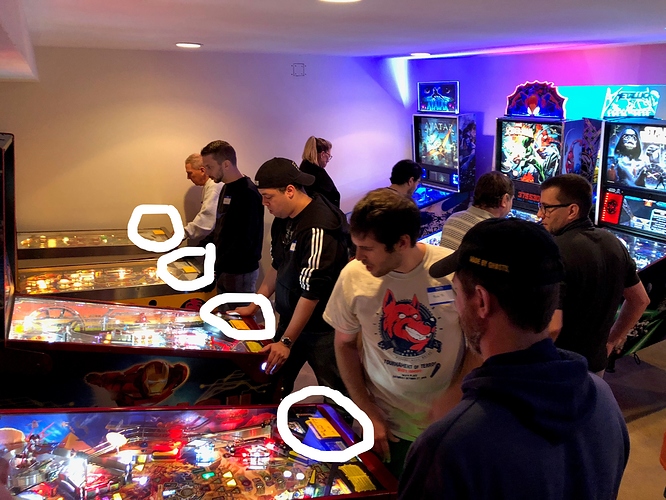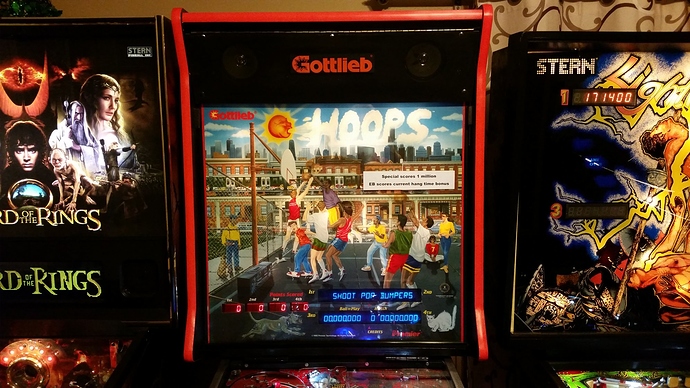Then why are headphones allowed?
Because your question answered itself. ‘allowed’ and not ‘mandated’
If someone wants to be alone - they can be vs writing the rules to require it
Have to agree on knowledge being part of the skill set that the player needs to earn. Was watching the golf on TV today. What if someone in the gallery told selected golfers as they played each hole, “most of the people ahead of you came up short, use one more club”? Or “everyone’s miss-reading that putt, it breaks less than it looks”? The guys in the broadcast booth see things like that as the round progresses, but the players don’t. Wonder what the PGA rulebook says about pros or their caddies asking well-informed fans for tips?
edit: found it: “Rule 8-1 prohibits a player from asking for advice from a spectator but does not prohibit a player from receiving unsolicited advice because the player can’t control such an act”
Back in the ExpoBrawl days or earlier as far as doubles or teams we would coach during play.
Agree - and that’s part of the fun in team formats. But I also think it’s easy to draw a distinction between team formats and solo play 
Pinburgh ranks leagues based on the performance of that league’s members. I see no problem with FSPA keeping a private list of game tips. Nothing stopping other leagues from doing the same thing.
Actually they are because whatever points the plunged player gets, they keep.
If that’s the reason for this private sharing of information, maybe Pinburgh shouldn’t rank affiliations. Clearly each person makes their own choices but I would greatly prefer to see such information shared with everyone (as I mentioned in the strategy discussion).
I look forward to players posting an announcement on TiltForums every time they tell their buddy at Pinburgh: “hey, watch the AFM in bank 57, it’s got sneeze tilt”.
BTW, FSPA always has a very large contingent at Pinburgh, enough players where we wind up smack in the middle of the bell curve. Our affiliation percentage is pretty much nailed at 50%.
This is an interesting discussion. I make it clear to everyone (both leagues and tournaments) that they are more than welcome to discuss rules and strategy between balls, but yelling at someone to “shoot the left orbit” while they are playing is not allowed. I’ve always felt that as long as I’m upfront on the rules, then no one has any room to complain.
As for ball save and out of turn, I encourage people to help out their fellow league members. We have people of all skill levels and the minute the players in my league want to go “hard core”, I’m out. If you want something cut throat, my events are not where you’re going to find it. I think that’s part of the reason we’ve grown from 7 - 8 people to 35 in such a short time. It’s competitive enough for the skilled players and laid back enough for the people that just want to get out of the house and hang out with some friends.
It’s a tough balance, but something I strive for at each event.
I’ve run into situations before where a new player didn’t know the difference between a ball save and an extra ball. They were walking away from their ball save thinking it was an extra ball. We had a situation over the weekend where a new player almost played their extra ball thinking it was a ball save. One of the members of their group stopped them before they plunged.
Ironically enough, that player ended up second on the game only to miss the finals for doing the right thing. He could have very easily sat on his hands and done nothing while the other player DQed themselves, but he chose to do the right thing irrespective of the consequences to himself. That’s the type of person I want at my events.
Sorry for the rambling… 
The other side of it, though, is that in events with skill based groupings, I’ve often seen inexperienced players actively coaching each other through the game as they play. Yes, they’re still competing against each other, but they’re also happy to learn together as they go. “Hey, whatever you did just lit lock on the ramp!” I think that’s fantastic, and personally would hate to disqualify that sort of shared experience the participants are choosing for themselves.
I agree that the TD should state what rules they are using/enforcing. I do this at my events because every 2-3 events or so it seems there’s at least 1 new person (good for me and the venue!). I make a document on my phone about what to go over that includes how to start an X player game, deal with extra balls, etc.
I explicitly allow coaching at my events but mention that you have to ask someone and people can’t just tell people. My events are more beginner-intermediate so I feel this is important to making people better. For a while I was sitting out my events now and then to see if people wanted coaching. From my observation, the people who want coaching are intermediate players, beginners are definitely too shy to ask until after the game is over.
Side note: There is one game I have seen people have a strong reaction to for coaching (or “F this game I’m never learning it”)…Star Wars. There’s probably some game design theory here on why this one machine provokes such a strong reaction (40x video mode? Moving multipliers? Different character abilities?)
I definitely want to try some pair/team events where teams coach the active player, though I’m curious if people would come out for those and play because I don’t think that’s an IFPA approved format so no WPPR points right?
I have been to some other events that allow coaching, which has definitely helped me learn KISS and Star Trek (Stern). I appreciated them, and they were all <10 people tournaments so it was pretty casual. I can see why this sort of thing wouldn’t be encouraged at “majors” but at the “local” level I think there’s a lot of benefit to coaching, calling out ball saves, warning about out of turn, etc. As someone mentioned it’s like “practice” for the big events/leagues.
I think “willingness to share strategy” tends to increase as players get better. For Bowen and the Lefkoffs to freely tell their opponents specific game strategies is great for all of us. But, that’s easier for them to do because they’re also huge favorites in most matches (in both skill and rules knowledge).
I’ll always share after a match. But if I’m in the final four at Pinburgh and find myself knowing things about The Munsters that Raymond, Keith, and Escher don’t know…I’m going to keep that to myself. I’m at a massive disadvantage in terms of flipper skills, why give away the one advantage I have?
Game knowledge can be a big part of success at pinball. I love helping people outside of competitions. I’m happy to tell people after a match. I want everyone to get better at pinball. But…I think this would all be a LOT less interesting if everyone had perfect rules knowledge available to them at all times.
WPPR’s are personal so teams/pair tournaments are not IFPA sanctioned. That said, we recently had normal round-robin tournament which acted as seeding for a split-flipper (one flipper each) tournament (first seeded played with last seeded player). A lot of coaching and less skillful players learning from more experienced players due to the seeding. The last tournament was not WPPR eligible of course, but most likely the most appreciated ![]()
Very true, but coming at this from the other side, if it’s not possible for someone to come into a game with perfect rules knowledge if they do their homework, that needs to be disclosed. For example: special tournament ROMs or modern games that get code updates after being released. Those need to be announced to all participants so everyone knows what version of they game they are playing and I’ll continue to lobby for it until TDs start doing it.
I would say tho - don’t confuse the two things… personalities and ‘better players’. There are some great players that will be very chatty with you about things like this during a competition - there are others that won’t. Point being, the ‘willingness’ has more to do with the personalities than with their skill IMO. Those better players also tend to be more knowledgable and more interested in the topic minuta then a less experienced player… but the impetus to share or not is still gated by the personalities IMO.
The better players may be more interested and versed in this minuta - but that alone doesn’t make them more progressive sharers.
To draw another distinction… in the past players would often share knowledge about games because knowledge had to be pooled to really get better insight into things. People didn’t have access to glass off, or even access to such a wide variety of games. People were playing games on location and making notes on how things played… or what tidbits could be squeezed from employees on RGP, etc. People shared with their peers as a ‘collective good’ or ‘give and take’ model. The community attitude was one that supported the idea of sharing… rising tide raises all boats kind of thing… but that didn’t necessarily mean people were into being TEACHERS or GUIDES. The idea of improving a rulesheet was not necessarily the same as the guy willing to coach or teach per say. Those ideas we see so much more now now after people like pinball101, bowens tutorials, etc I’d argue is a different mindset that isn’t necessarily a full overlap with those who simply want to build the knowledge base.
You mean like this? Where every change/code etc is clearly stated on any games that are not default? I do this for all the Delaware tournaments. The picture shows Iron Maiden with a card stating that it has code v1.05 and secret skill shots are disabled. Iron Man, Iron Monger is set to HARD and last shot has to be the center to raise Monger. The 3rd and 4th games are both EM’s, and the cards state they are set to 5-ball.
Bless you for doing this. I wish more TDs did.
I put 8.5x11s on the backglass of each game with large print on them. You’d be shocked how many people still don’t read them. Oh well, at least it’s posted.

